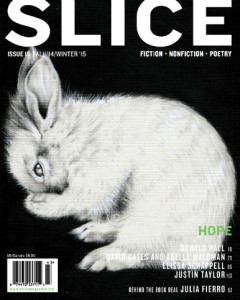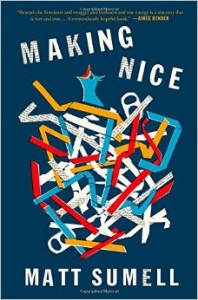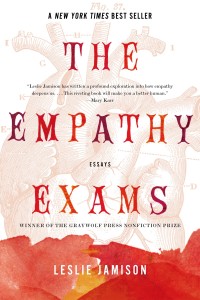Posted by Rachel Hall, GD Faculty Advisor
Ok, Gandy Dancer 3.2 was fat and juicy, but now what? I asked some Gandy Dancers and FOGD (Friends of Gandy Dancer) what they are reading or planning to read this summer. I also asked them about their best summer read ever as well as what might surprise us about their bookshelves. Here’s how they responded:
3.2 Managing Editor, Amy Bishop, plans to read in three genres! She says, “for non-fiction, I really want to get my hands on Yes Please by Amy Poehler and Bad Feminist by Roxane Gay. I’ve read a lot about both books and friends have highly recommended them too. Poetry-wise, I NEED to read Danez Smith’s new collection [insert] boy and finally get around to reading Richard Siken’s Crush. As for fiction, I never got around to A Spool of Blue Thread by Anne Tyler, which was on my book stack at school and The Bone Tree by Greg Iles, which just came up on the NYT Bestseller’s List and looks fascinating.”
Our new PR specialist, Jenna Colozza is tackling BIG books this summer: The Pillars of the Earth by Ken Follett and Les Miserables. She also plans on reading the several issues of Slice magazine she received during the semester and couldn’t get to because she was reading for her classes.
Graham Drake, Professor of English, says, “Besides Wolf Hall, here are my good intentions: I want to re-read Hardy’s Far from the Madding Crowd; Sir Walter Scott’s Ivanhoe for the first time; the novel Quartier Perdu (in French!) by Nobel winner Patrick Modiano; Keay’s History of China; Hermione Lee’s biography of Virginia Woolf; Medieval Schools by Nicholas Orme (sort of fun, but really for work); and a backlog of New Yorkers.
Jess Fenn, English Department Lecturer says “For the first part of the summer, I’ve treated myself to a trove of lyric essay collections. I’m rereading Lia Purpura’s Rough Likeness, and also adding On Looking and Increase. One of the essays in On Looking has really captured my attention lately because of its wonderful attention to everyday sensations–it’s called “Glaciology” and it’s online if you want to check it out. In addition to the Purpura, I can’t wait to read Eula Biss’s On Immunity, Thomas Page McBee’s Man Alive, and Lidia Yuknavitch’s The Chronology of Water, a book-length memoir written in very short chunks. Surprising might be Mary McCarthy’s Memories of a Catholic Girlhood–one of those classic memoirs (like Tobias Wolff’s This Boy’s Life, which I adored) that I’ve just never gotten around to reading as of yet. Best summer reads? Last summer, for me, it was Caryl Phillips’ Crossing the River, a fantastic novel in four parts.”
Kristen Gentry, Assistant Professor of English says “I’m currently reading Matt Sumell’s Making Nice, a short story cycle recommended to me by recent Geneseo graduate Amy Bishop. She said Sumell’s protagonist, Alby, reminds her of Yunior from Junot Diaz’s work. I’m always looking for short story cycles to read and I love Diaz so she didn’t have to sell me any further on the recommendation. So far, my favorite story is “Rape in the Animal Kingdom”
Next, I’ll be reading Asali Solomon’s Disgruntled. I’m also looking forward to reading Toni Morrison’s newest novel, God Help the Child, Claudia Rankin’s Citizen: An American Lyric (winner of the National Book Critics’ Circle Award for Poetry) and Jacqueline Woodson’s Brown Girl Dreaming (National Book Award Winner for Young People’s Literature). Tracy K. Smith’s memoir, Ordinary Light, and Isabel Wilkerson’s The Warmth of Other Suns: The Epic Story of America’s Great Migration are also on the list.
The most surprising books on my list would probably be Mary Karr’s The Liars’ Club and Leo Tolstoy’s Anna Karenina because both are important canonical texts that many would assume I’d already read.
It’s hard to determine the best summer read ever because I have a bad memory and I’m always reading so it’s hard for me to remember when I read what. And you want me to pick just one book. Just one? That’s so hard, but I’ll settle on Rita William-Garcia’s One Crazy Summer. It’s a book for elementary to middle-school aged children, and I came across it last summer when I was searching for children’s books with black female protagonists. One Crazy Summer took me back to summers reading as a girl. It made me wish that there had been more books like it for me to read, but it also made me appreciative that black girls like the one I used to be (and those who are vastly different from who I used to be) have the opportunity to read more stories that feature black girls like, and unlike, themselves. Beyond this, it reminded me that children’s literature can be incredibly rich, real, powerful, and inspiring.”
Managing Editor of 3.2 Erin Koehler says “I’m finishing Leslie Marmon Silko’s memoir The Turquoise Ledge, which is very good and quiet. After that I want to read her novel Gardens in the Dunes. I guess I’m on a Silko kick right now. After meeting her in ABQ at the Sigma Tau Delta Conference I wanted to read a few things of hers I hadn’t gotten to yet. And then after that I want to read a YA (I think?) book that Milne Library Editing and Production Manager, Allison Brown recommended to me called The Strange and Beautiful Sorrows of Ava Lavender by Leslye Walton.”
Courtney O’Gorman, who has been an amazing PR specialist and leaves us—sniff sniff—for England, is psyched to read Bad Feminist by Roxane Gay. She’s also excited for Gay’s forthcoming Ted Talk.
Ashley Pankratz, Adjunct Professor of English, says, “Here’s what’s on my nightstand:
- Sweet Heaven When I Die: Faith, Faithlessness, and the County in Between (Jeff Sharlet). So far, it’s a gorgeous, difficult book of essays that seem to ramble before you realize how tightly they’re woven.
- A God that Could be Real (Nancy Ellen Abrams). My dose of science for the moment. Discusses the idea of “God” as an emergent phenomenon that is evolving with the universe. It’s infuriating and very cool. There are passages where I feel she condescends to her readers, and others I have to read three times. It’s honestly changing me in a significant way.
- The Goldfinch and All the Light We Cannot See–both of these I feel like I need to read, because I should know what everyone’s talking about. Haven’t started Goldfinch. Doerr’s book I’ve been reading all semester. I think many passages are beautiful, but I’m having difficulty investing in the story, and I’m really put off by the present tense, which almost never happens to me as a reader. It’s the book I turn to at the end of the day when I’m too tired to appreciate the good stuff.
- Gatsby. I’m reading it again, because I’m reworking my novel with a narrator inspired by Nick C.
- Going After Cacciato by Tim O’Brien. I have somehow never read this! And I am loving the imagination, the writing, the brilliant structuring of the chapters. I will be teaching this, I think, in the fall.
- Never Let Me Go by Kazuo Ishiguro. Recommended to me by John Panus, a student at Geneseo whose opinions I value. I’ll be starting this next week.
- The French Lieutenant’s Woman by John Fowles. I have always wanted to read this, but am making myself finish Anthony Doerr’s work before leaping into another massive text.
- The Unwinding by George Packer. I’ve been reading this off and on for a while. Walmart’s evil, which we already know, but it offers a glimpse into the lives of the rust belt (and politics) that I find super compelling.
That’s what’s on my table. There’s not room for much else. I make myself leave all the physical copies of the books on the nightstand until I finish them, one by one. I have to set my bedtime glass of milk on the floor for now.”
Lytton Smith, Assistant Professor of English, says “for my narrative fix, I’m going to finally dive into poet Erica Wright’s noir novel, The Red Chameleon, which I’ve been meaning to read since last year (a sequel is due in November); she’s the author of the fantastic poetry collection Instructions for Killing the Jackal (Black Lawrence Press, 2011), and poetry editor at Guernica. Also in that vein: the final installment of Ben Winter’s pre-apocalypse (yes, pre-!) The Last Policeman trilogy, titled World of Trouble. But I’ve got a stack of poetry collections, too, including Cecily Parks’ O’Nights (Alice James Books), Samantha Giles’ deadfalls and snares (Futurepoem), and Gabriella Klein’s Land Sparing (Nightboat).”
Managing Editor for 3.1, Kathryn Waring says, “It’s hard to choose–my list is so long! I still have a few more essays in The Empathy Exams by Leslie Jamison, so I’ll start there. Before I head off to UVA, where I’m a TA at the Young Writers’ Workshop, I’m trying to read a few classic graphic memoirs/novels like Marjane Satrapi’s Persepolis and Art Speigelman’s Maus.
I read Ander Monson’s Neck Deep and Other Predicaments in my Lyric Essay class last semester, so I’m super excited to read his new collection of essays, Letter to a Future Lover which just came out in February.
I heard Eula Biss and Maggie Nelson speak on a panel with Leslie Jamison at the AWP conference in Minneapolis, so I’m also looking forward to reading both of their books: On Immunity: An Inoculation and The Argonauts. I’ve read a few of Biss’s essays before, so I’m excited to read one of her full-length books–especially because she combines in-depth research with the personal, which is what I’m doing in my current writing.
I don’t know about the best ever summer read, but I think summers tend to be a little chaotic and crazy at times, so reading some sort of collection, anthology, or literary journal is usually best since you can pick them up and read just one section pretty easily. I picked up a plethora of literary journals at AWP that I’m looking forward to delving into–Black Warrior Review, Fourth Genre, River Teeth, Sonora Review… Plus, reading literary journals has an extra bonus: you can start to think about what journals might be the best home for your own writing.”
Steve West, English Department Lecturer, breaks his reading up into work and play.
“For work: The Four Fundamental Concepts of Psychoanalysis by Jacques Lacan. I’m writing about desire in a current project, and all signs point to Lacan giving me what I need (ha ha, get it?)
For play: The Brief Wondrous Life of Oscar Wao by Junot Diaz. I don’t get around to reading contemporary fiction much, so summer is my time to catch up on the good ones I’ve missed.
Perhaps as a surprise: I have a massive collection of X-Men comics (complete run from late 1970s to present). I’ve currently read everything up to 1991. I’m hoping to get through ’92 this summer.”
As for me, Rachel Hall, Professor of English and Gandy Dancer faculty advisor, as soon as the last paper was graded, I dug into The Best American Short Stories 2014, and found there a number of jewels which guided me onward, first to Laura van den Berg’s collection What the World Will Look Like When All the Water Leaves Us, an amazingly rich collection, and then to her second collection, The Isle of Youth. I can’t get over how much happens in her stories and how she pulls it all together too. I’m saving her novel Find Me for later in the summer. Also on my list is Karen Russell’s Vampires in the Lemon Grove, and Benjamin Nugent’s novel Good Kids.
Also I’m excited to dig into The Little Magazine in Contemporary America, edited by Ian Morris and Joanne Diaz, a much needed look at literary journals in this time of great growth and change.
What about you, Gandy fans—what are you reading? We hope it’s illuminating, mesmerizing, fun, surprising, gorgeous, inspiring. Do let us know!





